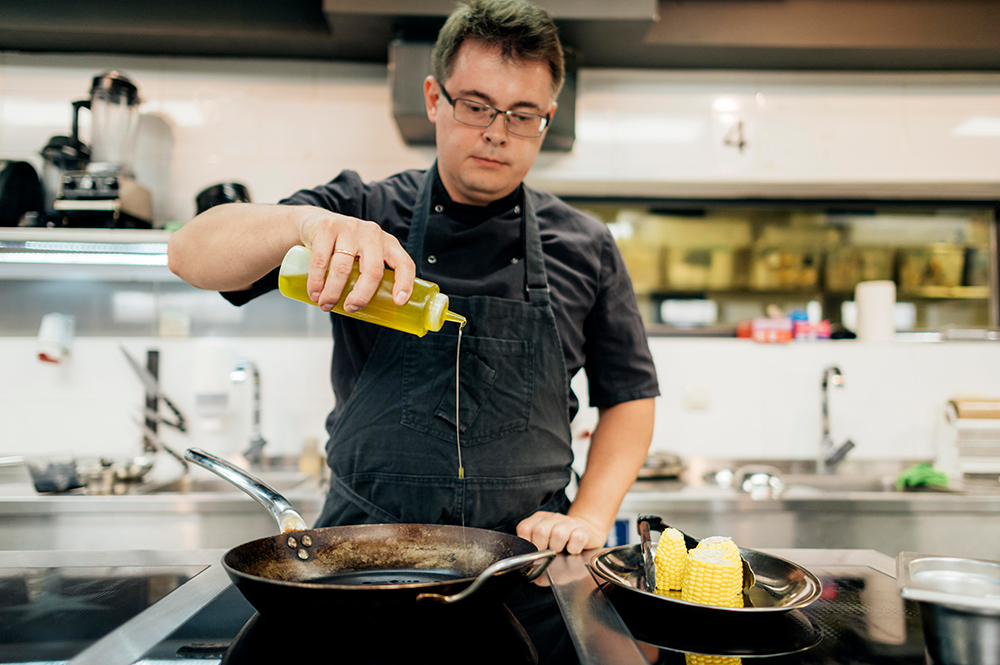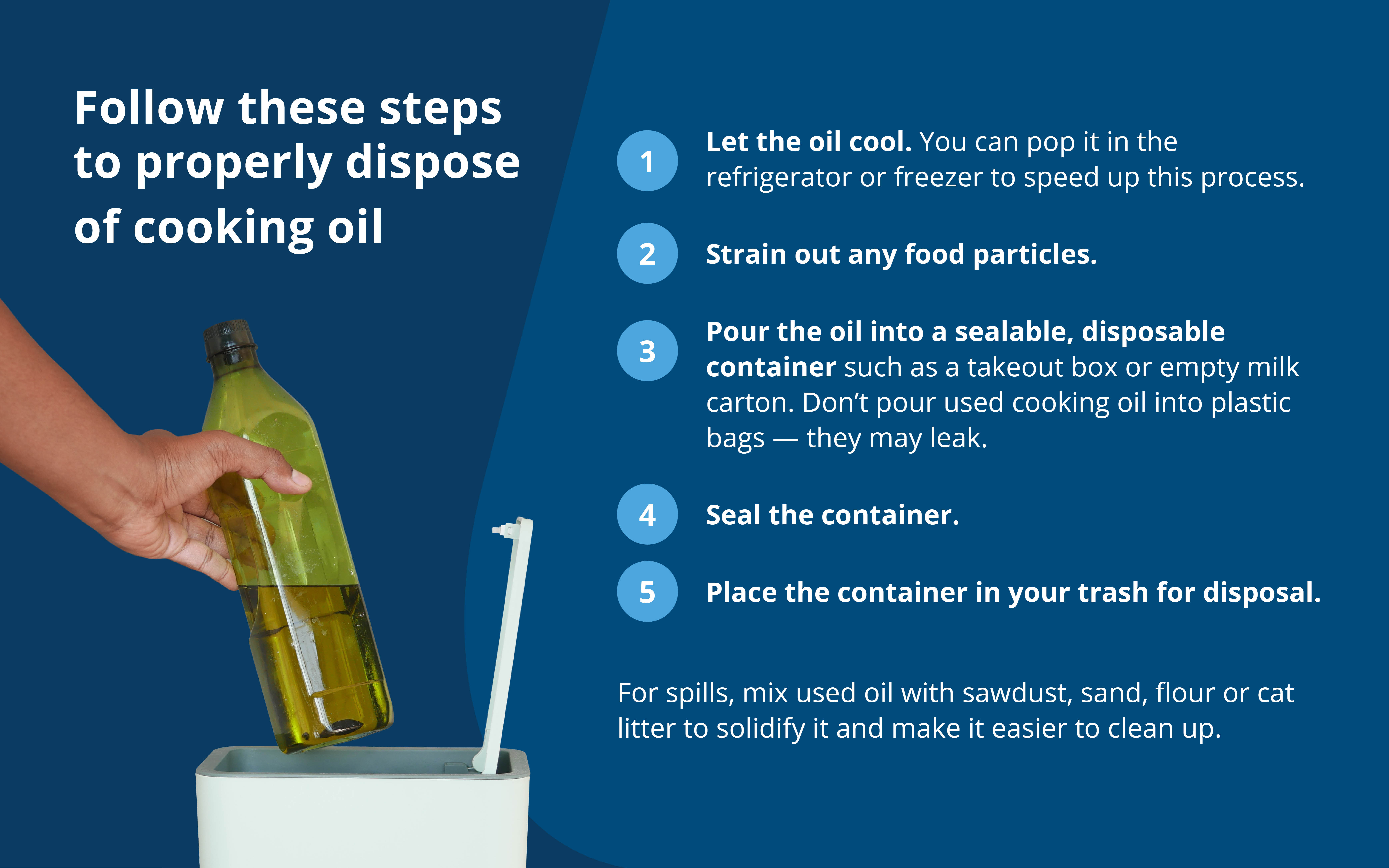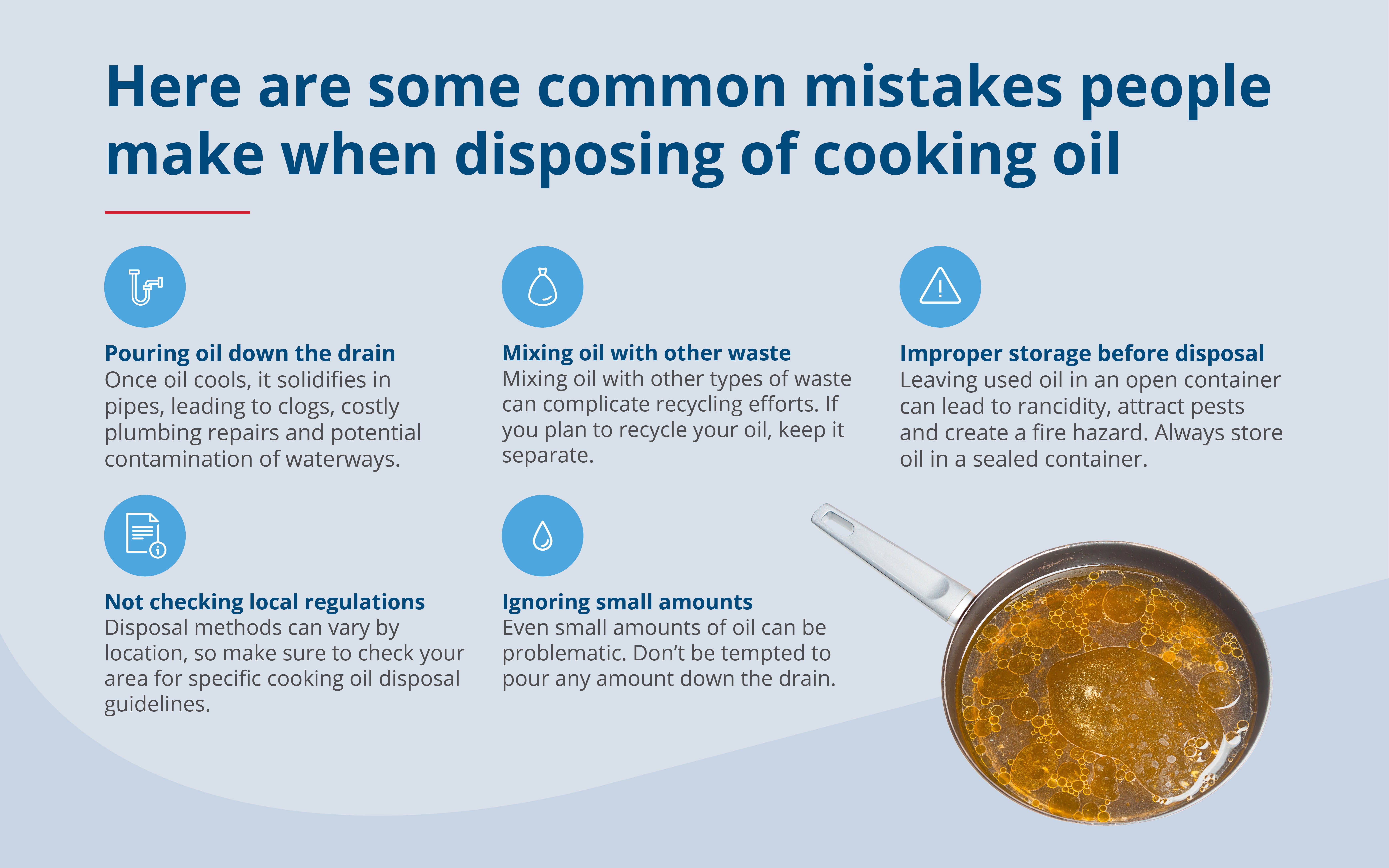
How to Dispose of Cooking Oil
Not sure what to do with used cooking oil? We're here to help with a step-by-step guide.Byline: BTB Author
November 4, 2025 / Time to read: 5 minAfter preparing fried chicken, stir-fry or bacon and eggs, pouring used cooking oil down the drain might seem like the fastest, easiest solution. But, it's actually one of the worst choices you can make for your plumbing — and the environment.
We’ve outlined how to dispose of cooking oil in a safe, effective and eco-friendly way. We’ve also included some helpful information about recycling cooking oil.
Why Proper Cooking Oil Disposal Matters
Disposing of used cooking oil properly helps prevent:
Clogged pipes and sewers
Pouring oil down the drain can cause blockages in your home's plumbing and the surrounding sewage system.
Water pollution
Oil that reaches waterways can create a slick on the water's surface, preventing oxygen from reaching aquatic life.
Soil contamination
Oil dumped on the ground seeps into soil, which can harm plant life.
Fire risk
Used cooking oil is highly flammable if stored improperly.
How to Dispose of Cooking Oil at Home
Follow these steps to properly dispose of cooking oil.
- Let the oil cool. You can pop it in the refrigerator or freezer to speed up this process.
- Strain out any food particles.
- Pour the oil into a sealable, disposable container such as a takeout box or empty milk carton. Don't pour used cooking oil into plastic bags — they may leak.
- Seal the container.
- Place the container in your trash bin for disposal.
For spills, mix used oil with sawdust, sand, flour or cat litter to solidify it and make it easier to clean up.

How to Recycle Cooking Oil
Want to recycle your used oil instead? Explore drop-off and collection options for recycling used cooking oil. Check with your trash and recycling provider to see if they accept cooking oil in your organics bin or if they'll pick it up for recycling. Alternatively, you can search for local household hazardous waste (HHW) collection sites. They'll outline the steps necessary to prep oil for disposal and collection.
What Happens to Recycled Cooking Oil
Once collected and processed, used cooking oil can be converted into:
- Biodisel, a renewable, biodegradable fuel that can be used in diesel engines
- Animal feed additives
- Soaps and detergents
- Polishes and waxes
- Oleo-chemicals often used for personal care products and cosmetics
How to Reuse Cooking Oil
One major reason people need to dispose of large quantities of vegetable oil is that it can become rancid. Cooking oils primarily go bad due to oxidation, which occurs when unsaturated fats in the oil react with oxygen in the air. Exposure to heat, sunlight and moisture can accelerate the degradation of oil. When oil spoils, you'll notice any or all of the following:
- Unpleasant odor (sharp, metallic or bitter)
- Off flavor
- Thickening or cloudiness
- Lowered smoke point
If your oil has not gone bad, don't be so quick to get rid of it. You can typically reuse it two to four times, depending on the temperature, food type and how much food you’re cooking. Only reuse oil for cooking — not for dressings or other recipes where the oil won't be heated again.
Follow these steps for safe reuse.
- Leave the used cooking oil in the pan to cool down.
- Once cool, carefully transfer to a glass container.
- Seal the container tightly.
- Store in the refrigerator for
up to three months .
Cooking Oil Disposal Mistakes to Avoid
Here are some common mistakes people make when disposing of cooking oil.
Pouring oil down the drain
Once oil cools, it solidifies in pipes, leading to clogs, costly plumbing repairs and potential contamination of waterways.
Improper storage before disposal
Leaving used oil in an open container can lead to rancidity, attract pests and create a fire hazard. Always store oil in a sealed container.
Not checking local regulations
Disposal methods can vary by location, so make sure to check your area for specific cooking oil disposal guidelines.
Mixing oil with other waste
Mixing oil with other types of waste can complicate recycling efforts. If you plan to recycle your oil, keep it separate.
Ignoring small amounts
Even small amounts of oil can be problematic. Don't be tempted to pour any amount the drain.

Cooking Oil Disposal Regulations
Regulations for cooking oil disposal apply primarily to commercial establishments, especially restaurants and other food-service businesses. These businesses typically generate large amounts of oil and are required to have proper disposal systems in place to prevent environmental and plumbing issues.
- Don't pour down drains: This is a universal guideline to prevent clogs and sewer backups.
- Use grease traps: Most jurisdictions mandate the installation of grease traps to intercept oil and grease before they enter the sewer system. These traps need regular cleaning and maintenance.
- Store properly: Oil must be stored in appropriate containers to prevent spills and contamination.
- Remain compliant: Many areas have specific regulations when it comes to the collection and disposal of used cooking oil. Remaining compliant may involve working with licensed haulers or recycling companies.
Dodge the Drain and Dispose with Care
Used cooking oil is a valuable resource. In fact, the
And if and when you need to dispose of oil at home, make sure to do so safely and responsibly by following the steps outlined above. To learn more about safe handling of household hazardous waste, visit our
